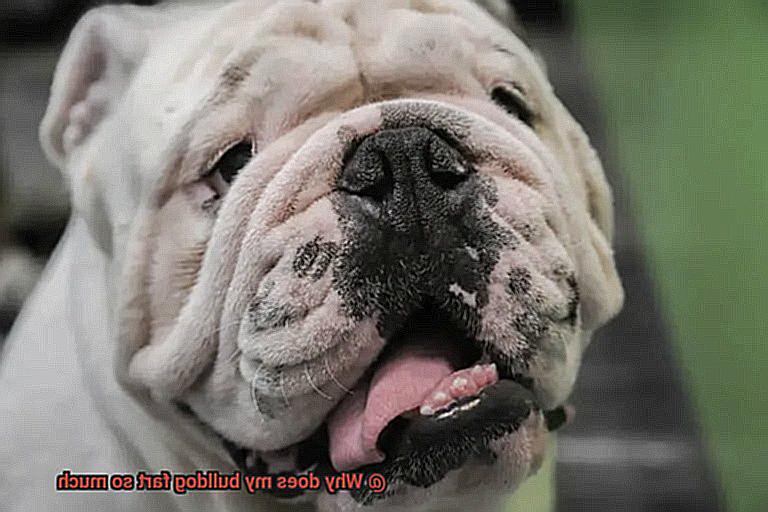Why does my bulldog fart so much?
Picture this: you’re lounging on your couch, enjoying a peaceful evening, when suddenly, a pungent cloud of gas envelops the room. Your bulldog, with an innocent expression on its face, looks at you as if to say, “Who, me?” Ah yes, the notorious bulldog farts have struck again.
But fear not, fellow bulldog enthusiasts. In this enlightening exploration, we’ll dive deep into the world of bulldog flatulence and uncover why these adorable pups seem to have an extraordinary talent for producing more gas than a hot air balloon.
From their unique dietary needs and sensitive digestive systems to breed-specific quirks that make them farting champions, we’ll leave no stinky stone unturned. But before we embark on this aromatic adventure, it’s essential to distinguish between harmless booty blasts and potential health concerns.
So, buckle up and prepare yourself for a journey through the fascinating realm of bulldog flatulence. By the end of this odorous odyssey, you’ll be armed with knowledge to understand why your beloved bulldog is unleashing a symphony of farts like no other. Get ready to decode those cheeky canine emissions.

Anatomy of a Bulldog: Why Do They Fart So Much?
Contents
- 1 Anatomy of a Bulldog: Why Do They Fart So Much?
- 2 Diet and Nutrition: What Foods Cause Excessive Gas?
- 3 Gulping Air While Eating: How Does This Contribute to Flatulence?
- 4 Gastrointestinal Issues: Could My Bulldog Have IBS or IBD?
- 5 Swallowing Foreign Objects: How Can This Affect Gas Production?
- 6 Medical Conditions That Can Cause Excessive Farting in Bulldogs
- 7 Strategies for Reducing Flatulence in Bulldogs
- 8 The Role of Exercise in Managing Digestive Health
- 9 Conclusion
One not-so-charming trait that often accompanies these lovable companions is their propensity for excessive flatulence. In this article, we will delve into the anatomy and unique characteristics of bulldogs to uncover the reasons behind their frequent farting. We will also provide practical tips for managing this stinky issue.

Unique Anatomy:
Bulldogs possess a distinctive physique that contributes to their flatulence predicament. Their short and stocky bodies, coupled with a compressed digestive system, make it challenging for them to properly digest food. This difficulty in digestion results in increased gas production and, consequently, more farting.
Gulpers Extraordinaire:
Bulldogs have a reputation for being enthusiastic eaters and drinkers. Unfortunately, their fast-paced eating habits often lead to swallowing excessive air, which further exacerbates their flatulence problem. Bulldogs may gulp air while devouring their meals or chugging down water, especially if they do so too quickly.
Brachycephalic Blues:
The adorable short snouts and narrow nasal passages of bulldogs, which make them irresistible to many, also contribute to their excessive flatulence. These facial characteristics make it more challenging for them to effectively expel gas, resulting in frequent flatulence episodes.
Sensitive Stomachs:
Bulldogs are notorious for having sensitive stomachs and dietary sensitivities. Foods high in fat or protein can be harder for them to digest, leading to increased gas production. Additionally, bulldogs may have allergies or intolerances to certain ingredients, causing gastrointestinal issues and excessive farting.
Health Conditions:

Various health conditions can also contribute to a bulldog’s excessive flatulence. Gastrointestinal issues like irritable bowel syndrome (IBS), inflammatory bowel disease (IBD), or gastrointestinal infections can disrupt normal digestive functioning and result in increased gas production.
Stress and Anxiety:
Bulldogs, being sensitive souls, are susceptible to stress and anxiety. Changes in their environment or routines can disrupt their digestion, leading to gastrointestinal issues and, you guessed it, more farting. It’s essential to provide a calm and stable environment for your bulldog to help alleviate stress-related flatulence.
Diet and Nutrition: What Foods Cause Excessive Gas?
Bulldogs, with their lovable and sometimes gassy nature, can experience excessive gas due to their diet and nutrition. Identifying the culprits behind this flatulent predicament can help owners make informed choices about their bulldog’s food. Let’s dive into some common foods that are known to cause excessive gas in bulldogs and how owners can identify these troublemakers.
High-Fiber Foods:
Bulldogs have sensitive digestive systems, and consuming excessive amounts of fiber can contribute to increased gas production. Foods like bran, beans, and certain vegetables like broccoli and cabbage are high in fiber and may lead to excessive gas in bulldogs.
Carbohydrates:
Grains and potatoes, which are often found in commercial dog foods, are rich in carbohydrates. Bulldogs may have difficulty digesting these ingredients, causing increased gas production.
Food Sensitivities or Allergies:
Some bulldogs may have specific food sensitivities or allergies, leading to digestive issues and increased gas production. Common allergens include chicken, beef, dairy products, and certain grains.
Dairy Products:
Dairy products such as milk and cheese can be difficult for bulldogs to digest. The lactose in dairy can cause digestive discomfort and excessive gas.
Fruits and Vegetables:
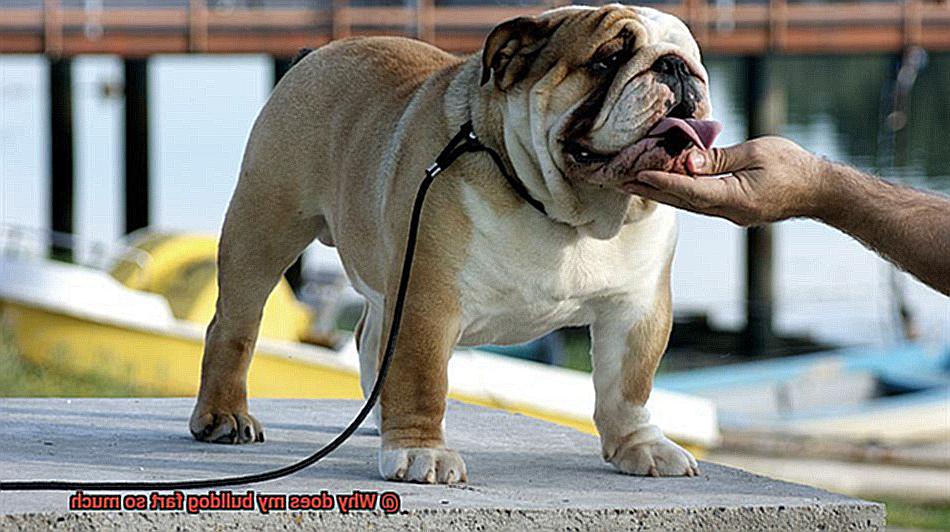
While fruits and vegetables are generally healthy for dogs, certain ones can be problematic for bulldogs. Fruits like apples and pears, as well as vegetables like broccoli, cabbage, and onions, contain sugars and fibers that are challenging for bulldogs to break down, resulting in increased gas production.
To identify the specific foods causing excessive gas in your bulldog, it is essential to pay attention to their diet and keep a food diary. Note any changes in their gas levels after consuming certain foods. Additionally, consulting with a veterinarian or a canine nutritionist can provide valuable guidance in determining the best diet for your bulldog and managing excessive gas.
In some cases, dietary supplements or digestive aids may be recommended to help reduce gas in bulldogs. Slow-feeders can also be beneficial, as eating too quickly or swallowing air while eating can contribute to increased gas production.
Gulping Air While Eating: How Does This Contribute to Flatulence?
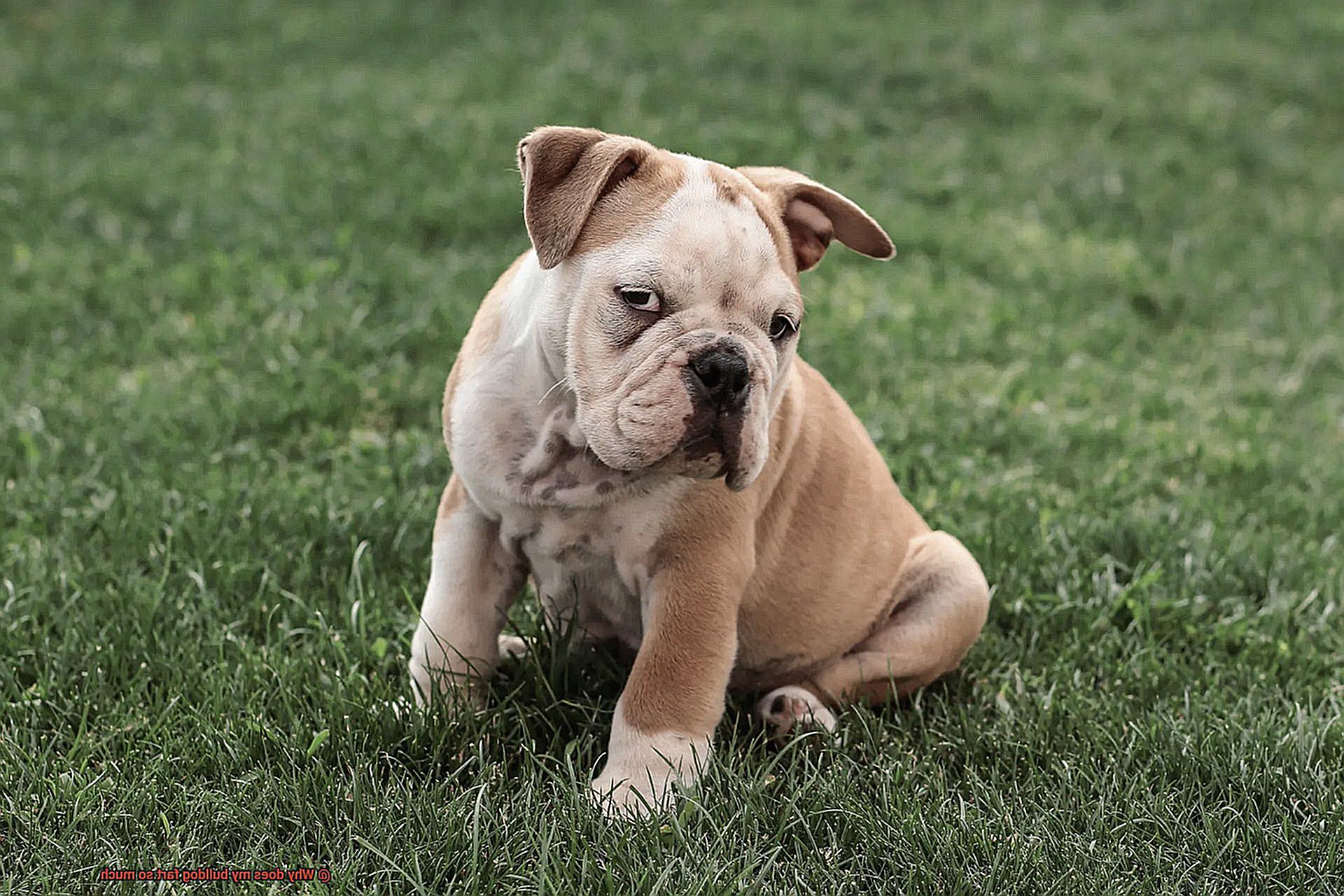
We all love our French bulldogs, but let’s be honest – their flatulence can sometimes clear a room. If you’ve ever wondered why your furry friend is so gassy, one of the key culprits could be their eating habits. French bulldogs are notorious for wolfing down their meals, and this behavior can inadvertently lead to the ingestion of air along with their food.
Why do French bulldogs gulp air while eating?
French bulldogs have a unique skull structure known as brachycephalic syndrome, which affects their respiratory system. This makes it difficult for them to breathe properly, especially while eating.
As a result, they tend to eat rapidly, swallowing large amounts of air in the process.
How does swallowed air contribute to flatulence?
When French bulldogs gulp air while eating, it enters their digestive system and gets trapped in their gastrointestinal tract. This excess air can cause bloating and distension, leading to discomfort and an increased likelihood of flatulence.
Moreover, the swallowed air can disrupt the normal digestion process by interfering with the breakdown of food in the stomach and intestines.
The swallowed air also leads to the production of more gas within the digestive system. Bacteria in the gut come into contact with undigested food particles and the trapped air, producing gases as byproducts of their metabolic activities.
These gases primarily consist of nitrogen, carbon dioxide, hydrogen, and small amounts of methane and sulfur compounds. These build up in the intestinal tract and eventually result in flatulence.
How can you prevent flatulence caused by gulping air?
- Use specialized slow-feeder bowls or puzzle feeders: These bowls have obstacles or patterns that force your French bulldog to eat more slowly and take smaller bites. By doing so, they are less likely to swallow large amounts of air while consuming their food.
- Divide meals into smaller portions: Feeding your French bulldog smaller, more frequent meals can help prevent overeating and reduce the chances of gulping air due to excessive hunger. This promotes better digestion and reduces the risk of flatulence.
- Create a stress-free mealtime environment: Stress and anxiety can exacerbate fast eating habits, leading to increased air swallowing. Ensure that your French bulldog has a calm and peaceful atmosphere during mealtime to help them relax and eat at a more leisurely pace, minimizing the intake of air.
By addressing your French bulldog’s eating habits and implementing these strategies, you can help reduce the occurrence of flatulence and create a happier, less gassy environment for both you and your furry companion.
Remember, it’s always important to consult with your veterinarian if you have concerns about your French bulldog’s digestive health. They can provide personalized advice and guidance based on your dog’s specific needs.
Gastrointestinal Issues: Could My Bulldog Have IBS or IBD?
If you’ve noticed that your French bulldog has been experiencing frequent tummy troubles, it’s time to dig deeper into the issue. Bulldogs, with their sensitive stomachs and unique anatomy, are prone to gastrointestinal issues.
In this post, we’ll explore two common chronic conditions that can affect our adorable bulldogs: Irritable Bowel Syndrome (IBS) and Inflammatory Bowel Disease (IBD).
Symptoms of IBS and IBD:
Both IBS and IBD can cause a range of digestive symptoms in our bulldogs. These symptoms may include excessive gas, diarrhea, abdominal pain, and even vomiting. You might notice that your furry friend’s bathroom visits are more frequent or that they have difficulty maintaining a healthy weight. If your bulldog is displaying any of these symptoms consistently, it’s time to consult with your veterinarian.
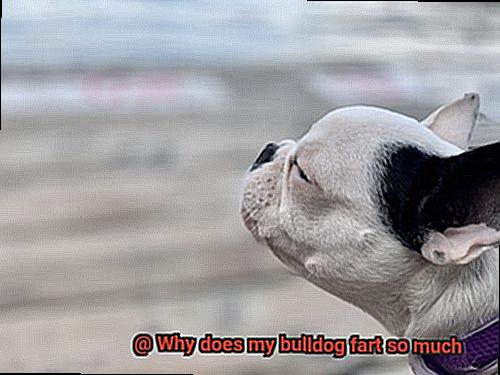
Causes of IBS and IBD:
The exact causes of IBS and IBD in bulldogs are still not fully understood. However, genetics, food allergies or sensitivities, and stress are believed to play a role in these conditions. It’s important to note that each bulldog is unique, and what triggers one dog’s symptoms may not affect another.
Diagnosis:
To properly diagnose IBS or IBD in your bulldog, a thorough examination by a veterinarian is crucial. Your vet may require a detailed medical history, physical examination, as well as diagnostic tests such as blood work, fecal analysis, and imaging. These tests will help rule out other potential causes of your bulldog’s gastrointestinal issues and provide an accurate diagnosis.
Treatment:
The good news is that both IBS and IBD in bulldogs can be managed with proper care. Treatment options may include dietary changes, medication to reduce inflammation and control symptoms, probiotics to promote healthy gut bacteria, and stress management techniques. Your vet will work with you to create a tailored treatment plan that suits your bulldog’s specific needs.
Tips for Managing Gastrointestinal Issues:
While working closely with your vet, there are several things you can do at home to help manage your bulldog’s gastrointestinal issues. Here are a few tips:

- Feed a high-quality diet: Opt for a balanced and easily digestible diet that is free from common food allergens such as grains and artificial additives.
- Identify trigger foods: Keep an eye on what your bulldog eats and note any potential trigger foods that worsen their symptoms. Avoid these foods in the future.
- Maintain a consistent routine: Bulldogs thrive on routine, so feeding them at the same times each day and providing regular exercise can help regulate their digestive system.
Swallowing Foreign Objects: How Can This Affect Gas Production?
I’m here to spill the beans on how swallowing foreign objects can turn your bulldog into a farting machine. Trust me, I’ve seen it all as an expert in bulldog health.
The Blockage Brigade
When your bulldog decides to swallow something they shouldn’t, it can cause a blockage or obstruction in their digestive system. Picture this: your pup chomps down on a sock or a toy, and it gets stuck in their intestines like a traffic jam during rush hour. This roadblock disrupts the normal flow of food and gas, leading to an increase in gas production. And we all know what that means – more farting than you can handle.
Inflammation Station
Not only does swallowing foreign objects cause blockages, but it also irritates the lining of your bulldog’s digestive tract. It’s like rubbing sandpaper on your delicate skin – ouch. This irritation leads to inflammation, which further contributes to excessive gas production. It’s like adding fuel to the fire (or should I say, gas to the belly?).
Bacterial Invasion
Now, here’s where things get really funky. Swallowed foreign objects can throw off the delicate balance of bacteria in your bulldog’s gut. Think of it as an invasion of gas-producing bacteria – they multiply like rabbits and wreak havoc on your pup’s digestive system. This bacterial overgrowth adds even more fuel to the already gassy fire. Yikes.
There are steps you can take to prevent this stinky situation from happening in the first place.
- Keep small items out of your bulldog’s reach. Trust me, they’ll find anything and everything to munch on.
- Choose toys wisely. Opt for sturdy toys that won’t break apart easily, and avoid ones with small parts that could be swallowed.
- Monitor playtime. Keep a close eye on your bulldog during playtime and redirect their chewing habits to appropriate objects.
If you suspect that your bulldog has swallowed a foreign object or is experiencing excessive gas, don’t hesitate to reach out to your veterinarian. They’ll perform a thorough examination and may recommend diagnostic tests like X-rays to assess the situation. Treatment options will vary depending on the severity but may include medication, dietary changes, or even surgery if needed.
So there you have it, folks – the scoop on how swallowing foreign objects can turn your bulldog into a gas-producing machine. Remember, prevention is key, so keep those hazardous items out of reach and always supervise playtime. And if your furry friend starts tooting up a storm, don’t be afraid to seek professional help. Your bulldog’s tummy will thank you.
Medical Conditions That Can Cause Excessive Farting in Bulldogs
If you own a French Bulldog, you may have experienced the not-so-pleasant aroma of their flatulence. While occasional farting is normal for dogs, excessive or foul-smelling flatulence can be a sign of underlying medical conditions. Let’s explore some of these conditions and how they can contribute to your Bulldog’s excessive farting.
- Gastrointestinal Inflammation or Gastritis: This condition occurs when the lining of the stomach becomes inflamed, leading to increased gas production and flatulence. Bulldogs can be prone to gastrointestinal inflammation due to their sensitive digestive systems.
- Food Allergies or Sensitivities: Bulldogs are known to have food allergies or sensitivities, which can result in excessive farting. Certain ingredients in their diet, such as grains or dairy products, can trigger allergic reactions and lead to digestive issues.
- Gastrointestinal Infection: Bacterial or parasitic infections can disrupt the normal gut flora in Bulldogs, causing increased gas production and flatulence.
- Brachycephalic Breeds: Bulldogs have short noses and flat faces, which can contribute to swallowing excess air while eating or drinking. This can lead to increased flatulence.
- Exocrine Pancreatic Insufficiency (EPI): Some Bulldogs may suffer from EPI, where the pancreas fails to produce enough digestive enzymes. This can result in poor digestion and excessive gas formation.
- Intestinal Obstruction: Blockages in the intestines can cause excessive farting in Bulldogs. These blockages prevent the normal passage of gas and stool, leading to increased flatulence.
- Gastrointestinal Disorders: Bulldogs with gastrointestinal disorders such as irritable bowel syndrome (IBS) or inflammatory bowel disease (IBD) may experience chronic flatulence as a symptom of their condition.
If your Bulldog is experiencing excessive farting, it is essential to consult a veterinarian. They can help diagnose and treat any underlying medical conditions causing this issue. Treatment may involve dietary changes, medication, or other interventions depending on the specific diagnosis.
Strategies for Reducing Flatulence in Bulldogs
Does your French Bulldog leave a trail of stinky toots wherever they go? Don’t worry, you’re not alone. Bulldogs, with their short snouts and compact abdomens, are prone to flatulence. But fear not, there are strategies you can employ to reduce the gas and bring fresh air back into your Bulldog’s life. Let’s dive into some expert tips.
Smaller, More Frequent Meals
Instead of one big meal, feed your Bulldog smaller portions throughout the day. This helps prevent overeating and reduces the amount of air swallowed during feeding. Plus, it keeps their metabolism steady and their tummy happy.
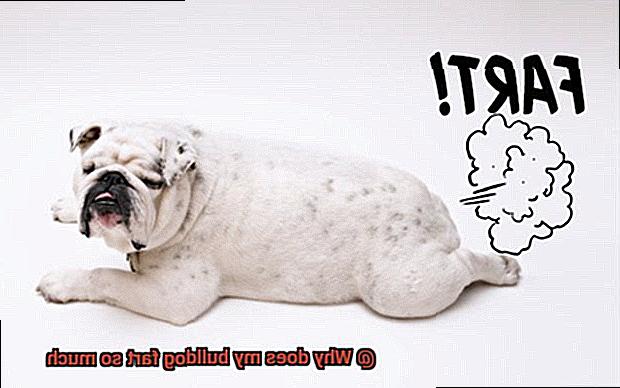
Choose High-Quality, Digestible Food
Opt for high-quality dog food that is easily digestible for Bulldogs. Avoid ingredients like soy, corn, and wheat, which can contribute to gas production. Consider a grain-free or limited ingredient diet for your Bulldog’s sensitive stomach.
Digestive Enzymes and Probiotics
Adding digestive enzymes or probiotics to your Bulldog’s diet can work wonders for their digestion. These supplements help break down food and reduce gas production in the gastrointestinal tract. It’s like giving them a little boost of gut health.
Slow Feeding Bowls and Puzzle Toys
Bulldogs tend to gulp air while eating, which leads to gas build-up. Slow feeding bowls or puzzle toys can help slow down their eating process, preventing excess air intake and promoting proper digestion. It’s like turning mealtime into a game.
Get Moving.
Regular exercise is crucial for Bulldogs’ overall health and can also help reduce flatulence. Physical activity stimulates bowel movements and prevents constipation, which can contribute to gas build-up. So grab that leash and get moving with your furry friend.
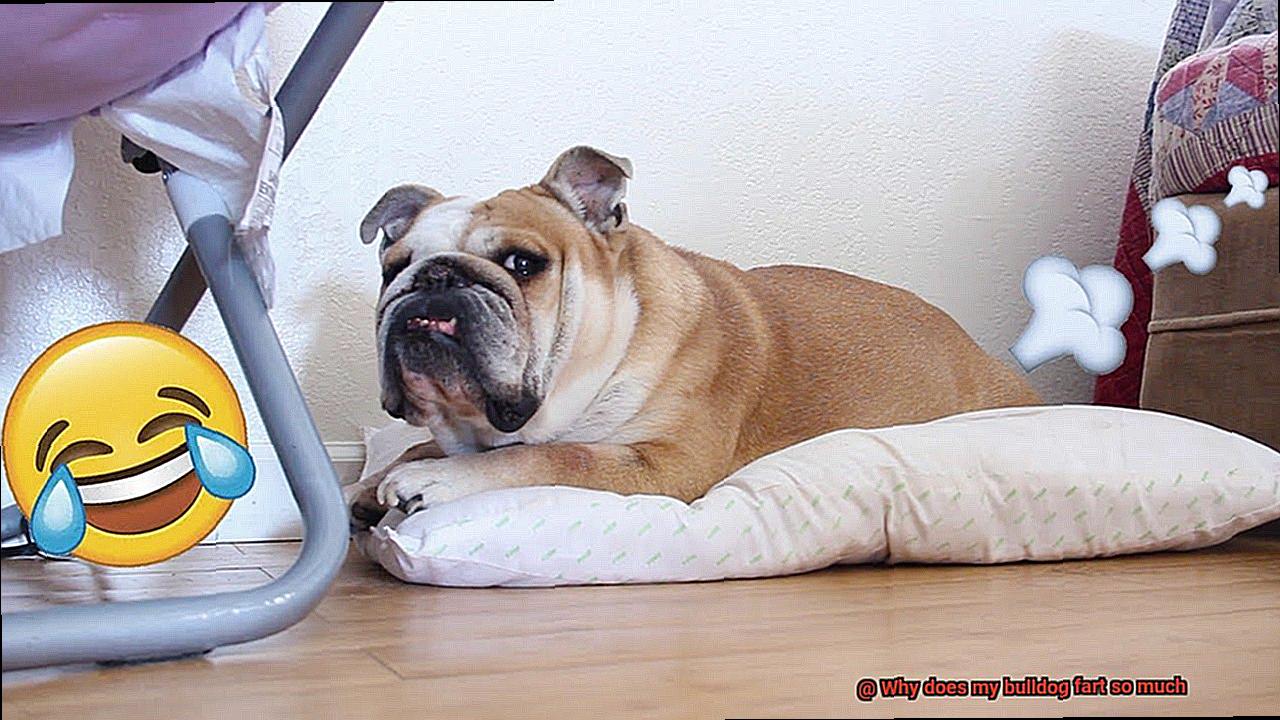
Say No to Table Scraps
While it’s tempting to share your delicious human food with your Bulldog, certain foods can cause gas. Beans, onions, and dairy products are notorious culprits. Stick to a balanced and appropriate diet specifically formulated for Bulldogs to keep their tummy troubles at bay.
Natural Remedies
Some owners find that adding natural remedies like ginger or activated charcoal can help alleviate their Bulldog’s flatulence. However, it’s essential to consult with a veterinarian before introducing any new supplements or remedies to ensure their safety and effectiveness.
Monitor Overall Health
If your Bulldog continues to have excessive flatulence despite dietary changes and other strategies, it’s essential to monitor their overall health and consult with a veterinarian. Flatulence can sometimes be a symptom of an underlying health issue that needs to be addressed.
The Role of Exercise in Managing Digestive Health
French Bulldogs are beloved pets known for their adorable appearance and friendly demeanor. However, like all dogs, they can experience digestive health issues that can affect their overall well-being. One effective way to manage and improve their digestive health is through regular exercise.
Exercise plays a crucial role in stimulating the digestive system and promoting healthy digestion in French Bulldogs. Here are some key ways that exercise can benefit their digestive health:
- Stimulates the Digestive System: Regular physical activity helps stimulate the muscles of the gastrointestinal tract, promoting the movement of food through the digestive system. This can prevent issues such as constipation and promote regular bowel movements.
- Prevents Gas and Bloating: Lack of exercise can contribute to digestive issues such as gas and bloating. When French Bulldogs lead a sedentary lifestyle, their metabolism slows down, leading to poor digestion and increased flatulence. Engaging in regular exercise helps regulate bowel movements and prevents the build-up of gas in the digestive system.
- Maintains a Healthy Weight: Obesity is a common problem among French Bulldogs and can significantly impact their digestive health. Excessive weight puts pressure on the digestive organs, leading to discomfort, indigestion, and increased flatulence. Regular exercise helps French Bulldogs burn calories, maintain muscle tone, and keep their weight within a healthy range. This reduces the strain on the digestive system and prevents digestive issues.
It’s important to note that French Bulldogs have specific exercise needs and limitations due to their brachycephalic (short-nosed) anatomy. They are prone to respiratory issues and overheating, so it’s crucial to provide them with appropriate exercise that does not put excessive stress on their airways or cause overexertion.
Consulting with a veterinarian or a professional dog trainer can help determine the most suitable exercise routine for your French Bulldog. A combination of moderate exercise activities, such as short walks, gentle play sessions, and mental stimulation games, can help improve digestion without compromising their respiratory health.
Zs89o_pEItQ” >
Conclusion
If you’ve ever wondered why your bulldog seems to emit an excessive amount of gas, you’re not alone.
It’s a common concern among bulldog owners, and there are several reasons behind this flatulence phenomenon. One possible explanation is their diet.
Bulldogs have sensitive stomachs and can be prone to digestive issues if fed a diet high in gas-inducing ingredients like beans or dairy products. Additionally, bulldogs tend to gulp down their food quickly, leading to increased air intake during mealtime and subsequent farting.
Another factor could be their brachycephalic (short-nosed) anatomy, which can result in increased swallowing of air while eating or drinking. Furthermore, certain health conditions such as food allergies, intestinal parasites, or gastrointestinal disorders may contribute to excessive flatulence in bulldogs.
If you notice that your furry friend’s farting is accompanied by other symptoms like diarrhea or vomiting, it’s essential to consult with a veterinarian for proper diagnosis and treatment. In the meantime, consider adjusting their diet by opting for easily digestible foods and avoiding known gas-causing ingredients.
Regular exercise can also help promote healthy digestion and reduce the frequency of flatulence episodes.
